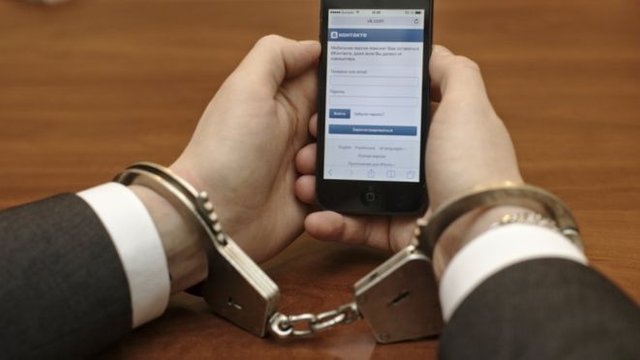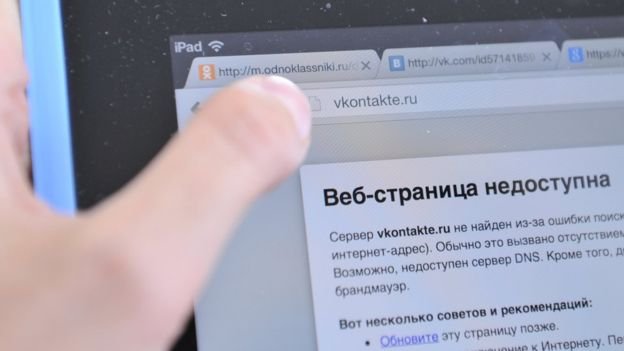He sat down for memes. How in Russia is punished for "extremism" in social networks
Experts and human rights activists say that in Russia the number of criminal cases for publishing on the Internet increases every year. Users are judged for pictures with memes, their reposts and even likes to them.
On Monday, the trial of 23-year-old Maria Motuznaya began in Barnaul due to the pictures saved in her VKontakte account. Images could be found only by digging into the photo albums on her personal page.
In Barnaul, the trial of Maria Motuzna began. She is accused of extremism because of the pictures "VKontakte"
The application for Motuznaya was written by two students of the Altai branch of the RANEPA. They appealed to the police, finding on the page of another resident of Barnaul, Daniel Markin, a meme, where the hero of the series "The Game of Thrones" John Snow was drawn a nimbus.
The BBC examined whether people in Russia were more likely to be imprisoned on charges of this kind.
What does the statistics say?
Information and Analytical Center "Sova" annually analyzes the law enforcement practice of Russian legislation on extremism.
According to his calculations, there were more criminal cases in 2017 than in 2016, but not by much. 228 people received sentences and 220 respectively. According to the head of the center, the number of such cases is increasing year by year.
Human rights activists claim that they are increasingly being asked for help in connection with the persecution under extremist articles of the Criminal Code.
“Literally over the past month and a half, seven people wrote to us, although they usually write one or two people a month. Basically, they are those in whose respect they have just filed a case, or there is a pre-investigation check,” the human rights activist told BBC "Open Russia" Valentina Dekhtyarenko.
Many appeals, she said, come from the regions. "Unfortunately, it is difficult to highlight statistics, as many agree to a deal with the investigation and do not tell anyone anything to get a fine or a suspended sentence," says Dechtiarenko.
“When the presidential campaign began, there was a clear feeling that this kind of criminal cases would not give the green light. But the conveyor worked, but it worked on the table, it was impossible to implement the cases,” said Pavel Chikov, head of the international human rights group Agora. the inauguration is time to get the accumulated materials. There is a feeling that this surge is associated with this temporary pause. "
What can be considered extremism?
There are several so-called “extremist” articles in the Russian Criminal Code. In addition to Article 282 ( incitement to hatred and hostility ), this is Article 354.1 ( rehabilitation of Nazism ), Article 148 ( insulting the feelings of believers ), which appeared after the punk prayer service Pussy Riot in 2012, and the newest one — 280.1 ( calls for separatism ), which entered into force in May 2014 after the annexation of the Crimea by Russia.
Russian investigating authorities and courts found violations of the law in photographs, photo collages, pictures with memes and even likes to posts. Here are some examples.
A 22-year-old resident of the Belgorod region posted a "VKontakte" photo on which she lit a cigarette from a candle in an Orthodox church . She was tried and fined for insulting the feelings of believers.
A law student, Alexei Sverdlov, who dreamed of becoming an investigator, was prosecuted and accused of calling for extremist activity. After the young man had an internship at the local IC, he was brought in for questioning by his former boss. In the guilt of the young man imputed 12 memes from his profile "VKontakte". Among them: photos of girls trying to eat noodles in Muslim robes (abayah), the image of Caucasians in red moccasins, as well as a meme about actor Will Smith and a robot who calls him "Negro".
A resident of the town of Sovetskaya Gavan in the Khabarovsk Territory put a Like in Odnoklassniki to a demotivator with death and shame Russian wishes for going to war in Donbass. A criminal case was opened against him on charges of inciting hatred on a national basis.
Yevgeny Saltykov, head of the Asatru pagan community in St. Petersburg, turned to the police after finding the figure of a Viking with a hammer over an Orthodox church in the saved pictures of VKontakte at the administrator of the Pagan community of Apples Idunn, Natalia Telegina. Saltykov explained that he was not going to encourage "fashion for disrespect, intolerance." Telegin was sentenced to two years conditional for insulting the feelings of believers.
Two supporters of nationalist views quarreled in St. Petersburg. One of them, trying to "troll" a friend, published a collage : an inscription was added to a friend's photo against the background of the USSR flag, from which it followed that he longed for the "triumph of Zionism". In addition, an angry friend called in a post to kill his comrade. Friends reconciled, but their business is now engaged in the Investigation Committee.
Which social network is more risky to use?
The undisputed leader in sentences - "VKontakte". According to the “Owls” report for 2017, 138 posts that attracted the attention of investigators were posted to VKontakte, 2 to Facebook, LiveJournal and YouTube.
The judicial practice of "Agora" allows us to conclude that the administration of "VKontakte" actively cooperates with the investigating authorities, discloses user data, their addresses, phone numbers, and time to access the Internet.
"We have not had to deal with the fact that Facebook, Twitter or even Odnoklassniki are coming to such cooperation," Chikov notes.
In January 2018, the criminal case was first brought to the post repost in Telegram. Dmitry Tretyakov from the Primorsky Territory reposted the recording of the journalist Arkady Babchenko in the group telegram-chat of supporters of the oppositionist Alexei Navalny. Militiamen didn’t have any complaints against Babchenko himself, but they brought the case to Tretyakov for public appeals to extremism and sent him to the SIZO.
How is life for people accused of extremism?
Rosfinmonitoring publishes a "list of terrorists and extremists" with full names, place and date of birth on its website.
At the time of this writing, there were 8.5 thousand individuals - Russians. The list includes both Maria Motuznaya and Chechen terrorists Doku Umarov and Shamil Basayev (now deceased).
People on this list face life-long blockage of bank accounts and dismissal from work.
Blogger Ruslan Sokolovsky, who received a suspended sentence for playing Pokémon Go in church , after the verdict completely switched to Bitcoins. His accounts and Webmoney, QIWI and PayPal accounts have been frozen.
Without a bank account: how do people convicted of extremism live
Found, repostn - in prison: how in Russia they judge for extremism
In Barnaul, the trial of extremism began for pictures "VKontakte"
According to the law, those involved in the “list of extremists” have the right to withdraw up to 10 thousand rubles a month in cash for themselves and each non-working family member. To do this, every time you go to the bank and write a statement.
In October 2017, the head of the Federal Financial Monitoring Service, Yury Chikhanchin, at a meeting with President Putin called it his achievement: "The most important result is that we launched in Russia a mechanism for extrajudicial freezing of assets of persons related to terrorism. Today difficulties this year alone have frozen about six million rubles. "
A clear procedure for defrosting frozen accounts does not exist, lawyer Ivan Pavlov explained to BBC. In rare cases, convicts manage to achieve delisting. For example, Dmitry Semyonov, a member of Open Russia, was excluded from the list, and that was only because he was amnestied.
Why are people being sent to jail for posting on the Internet?
The fight against extremism is a priority task that the state sets for security forces, explains Pavel Chikov.
“And the struggle is expressed in the number of cases initiated, in the number of convictions,” said the human rights activist. “The system works along the path of least resistance. Find, infiltrate and collect evidence on the neo-Nazi gang or terrorists — it takes a lot of manpower and resources. It’s easier words and collect evidence without leaving your own office. " 


Enjoy the vote! For more amazing content, please follow @metehn for a chance to receive more free votes!